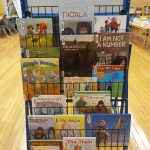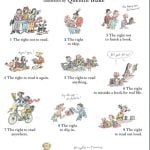November Message
PARENTS:
- Please do not consume food or drink around library books brought home
- Accidents (page rips, etc) happen. Please send the book back to school as soon as possible with a small note attached indicating the area to be fixed. We can’t fix it if we don’t know it needs some work 🙂
- If you lose a book, please let your child’s educator(s) know ASAP. This way we can add a note and put a plan in place or look at options.
- Please try and keep books for only a week at a time. Your child has a library period each week and if they do not return their book(s), they may not be allowed to take out more.
Good fit books
What is a good fit book? A student can open any book (fiction or non) to any page and start reading. If they encounter 2 words on the page that are tricky or unknown, it is still a good-fit book. They can make meaning using illustrations, diagrams, and other information on the page(s).
If there are 3 or more words on the page that are unknown and cannot be figured out, the book is too hard, put it back and try choosing another one.Tips for reading at home – or talking to older students about what they are reading:
- Model reading if it is something that you enjoy – recipes, news, fiction, nonfiction, audiobooks
- Take a trip to your local library – many things can be signed up for online or accessed online
- You may even be able to borrow sports equipment, board games, puzzles, or other things
- Bedtime is a great time to read together for little ones – you can always read the pictures and make up your own stories
- Little ones like repetition, don’t be surprised if they ask you to read the same story 9 times.
- For older readers – graphic novels are all the rage (think comics with a more in depth storyline).
- Inquire what they like about the graphic novel
- If they could change the story/a character, what would they change? Why?
- Is your older reader into nonfiction (books about real life topics)?
- Minecraft
- Animals
- Geography – find a pamphlet about a local ecological or conservation area to explore
- Crafts – drawing, textiles such as sewing, beads, or yarn crafts, cooking, woodburning,
- Magic
- Board Games – ex. Dungeons and Dragons information are all in books
- Sports
- People in history
- Board games are excellent ways to get older students reading – cards, instructions, researching other games like it or rules for card games
The 10 Rights of the Reader
https://s3.amazonaws.com/ArchiveImages/HB/2017/05/pennac_poster.pdf
- The right not to read
- The right to skip
- The right not to finish a book
- The right to re-read
- The right to read anything
- The right to mistake a book for real life
- The right to read anywhere
- The right to dip in
- The right to read out loud
- The right to be silent
Categories: Library




